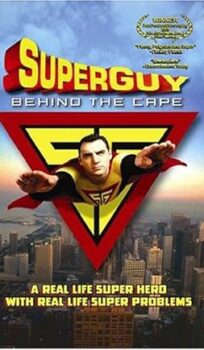Superguy: Behind the Cape(2000)
Submitted by Tornado Dragon
Though SuperGuy (Mark Teague) enjoys tremendous fame and adulation at first, it all starts to go downhill for him when people increasingly compare him with comic book superheroes and create this perfect image of him that is virtually impossible to live up to, such as placing high expectations on his output (like being able to save anybody, anywhere, anytime without tiring) and believing that he possesses all sorts of superpowers that he doesn’t actually have. As time goes on, SuperGuy finds himself wishing for a normal life more and more, and he starts to take time out of each day to conserve his energy and do other tasks.
Because he can’t be everywhere and is now taking time out for himself, crime and death rates eventually increase. A legion of imitators and wannabe supervillains then begin to pop up, and people start to willingly jump off buildings hoping that SuperGuy will save them, but they all end up falling to their deaths. Death also befalls the imitators when they jump off buildings themselves thinking that they can fly. SuperGuy then gets slapped with numerous lawsuits from the people he rescues, bystanders he accidentally hurts during his heroics, and the families of the jumpers, and soon after, several women start to come forward claiming that SuperGuy has fathered children with them, and other women who claim to have dated him in the past tell the press that he was an unpleasant man.
Eventually, all of the negative publicity and the pressures of being a superhero cause him to fall into a depression. This results in him temporarily losing his powers at random times, and he develops a smoking and drinking problem, the latter of which causes him to attack a reporter one night. A rebellious youth counterculture then forms, spearheaded by rap singer MC Nemesis, that attacks SuperGuy and his status as an authority figure, and this causes the “Supies” (a religious cult that worships SuperGuy) to destroy the building of Nemesis’ record label in retaliation. This act of terrorism by the supposed “good guys” sets off a chain reaction of evil and destructive acts across the U.S. by people desiring to become the “bad guys,” and SuperGuy gets unjustly blamed for it all. The American government starts to target him as a liability, and the nation becomes divided in their opinion of him.
SuperGuy then hits rock bottom when he accidentally diverts a crashing airplane away from downtown Los Angeles and right onto a freeway during rush hour traffic, resulting in the loss of hundreds of lives. The victims’ families take him to court, where he gets charged with manslaughter, and although he is ordered to cease and desist all superhero activities during his trial, he continues to do them. His remaining supporters desert him, and the police and the American government brace themselves for a potentially violent backlash to the final verdict, regardless of what it is.
One day, before the verdict can be reached, SuperGuy vanishes without a trace, and many theories are spun about what caused him to disappear (though he more than likely just opted to retire and live a very reclusive life somewhere else). SuperGuy Inc. – the company that controls his image – files for Chapter 11 bankruptcy, and unconfirmed sightings of him in civilian attire pop up in the tabloids daily. The narrator states that ordinary people can pick up where he left off and become heroes to others, adding that you don’t need special powers to be a hero, and we can learn that we never really needed SuperGuy to begin with.

